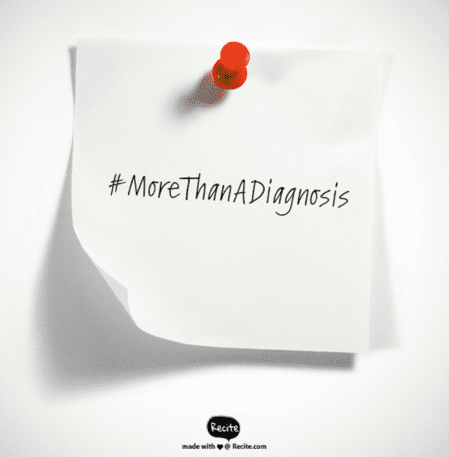When I facilitate groups, I ask people to say their name, something about themselves unrelated to their mental health disorder and, “And I’m more than that.” Inevitably, a person says something like, “Hi. I’m John. I’m bipolar, and I’m not much more than that.” I’m always sad when this happens because none of us should be defined by our mental health disorder. We are so much more than that!
I have bipolar disorder but I am so much more. I am a mother, a grandmother, aunt, sister, daughter, widow, friend, co-worker, ordained minister, author, public speaker, peer support specialist and the list could go on and on.
I don’t define myself by a diagnosis because it limits my options. This does not mean that bipolar doesn’t play a significant role in my life. It does. While I seldom have hypo-manic episodes, I am frequently depressed and occasionally have thoughts of self-harm and suicide. I am self-aware so I can proactively promote my recovery and deal with my thoughts of self-harm. For nineteen years now, I’ve had a therapist, psychiatrist and case manager. Bipolar disorder is a big part of my life but there is so much more. Let me tell you.
When I was 19, I married my husband who was a Vietnamese foreign student. This was in 1971 during the Vietnam War. When he graduated, we went to Vietnam where we did missionary work. Days before Saigon fell in 1975, we escaped back in the U.S. with our two daughters. A few years later we had a third daughter, my husband became critically ill, and he had a liver transplant. During the next five years, I attended college and earned a bachelor’s degree. After I graduated, my husband died during a second liver transplant. Since we were receiving survivor benefits from Social Security and didn’t need to work, I decided to go to seminary where I earned a master’s degree. Afterwards, I was ordained and became the pastor of a church. During most of this time, I was depressed and cut myself occasionally, but I wasn’t taking any psychiatric meds. While my husband was ill, I had the support of a social worker and, while I was in seminary, I saw a psychologist.
Eventually the depression became worse and I became suicidal and was hospitalized twice for ten days – once when I was 44 years old and once when I was 45. I had to quit working for the church, but I learned about recovery and began volunteering for a Warm Line. It’s been nineteen years since I was hospitalized, and I spent the first fifteen of those years depressed with frequent thoughts of self-harm because I was on the wrong medication. Still, I became the first person in Arizona to be hired as staff by their mental health agency. I provided peer support and recovery information.
I eventually became a case manager. Sadly, because the job was so stressful and I was over-medicated on the wrong medication, I became suicidal and had to quit. When the stress reduced, my psych meds were reduced and I had a hypo-manic episode. We realized I had been misdiagnosed and taking the wrong medication. We finally found the right medication, and I have done much better although I still have periods of anxiety, depression and hypo-mania. I am now working again as a peer support specialist.
We are capable of doing a great deal with our lives, and recovery is possible. Please believe in yourself.
Rev. Mary Alice Do, who has bipolar disorder, is a retired Disciples of Christ minister and has worked 16 years in the mental health community providing recovery information and advocacy. Read the rest of her posts for IBPF here, or watch her webinar on How Churches Can Promote Recovery. She also has a blog of her life story called Journey Towards Wellness.


